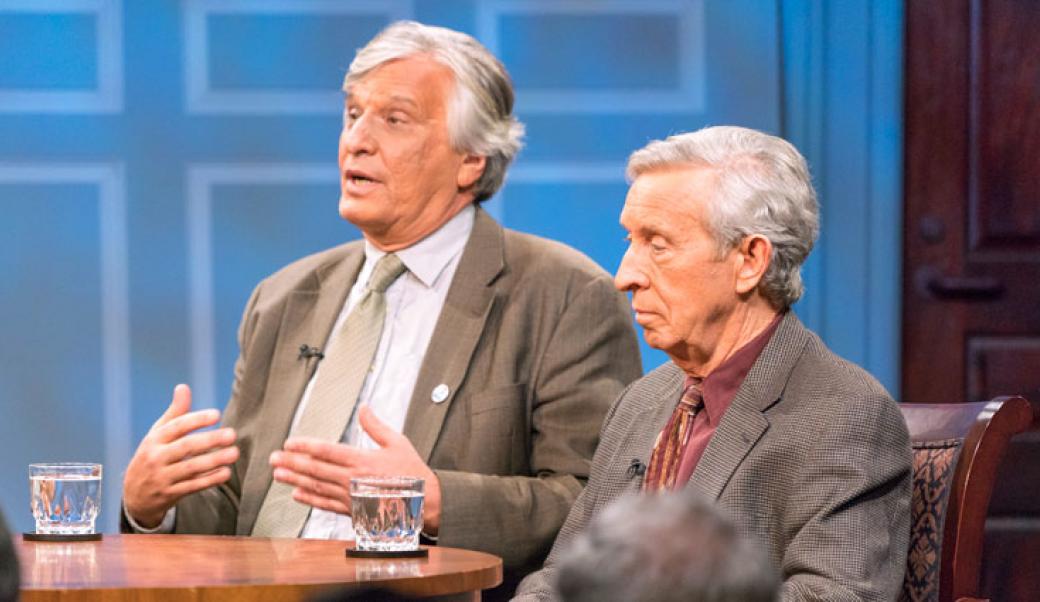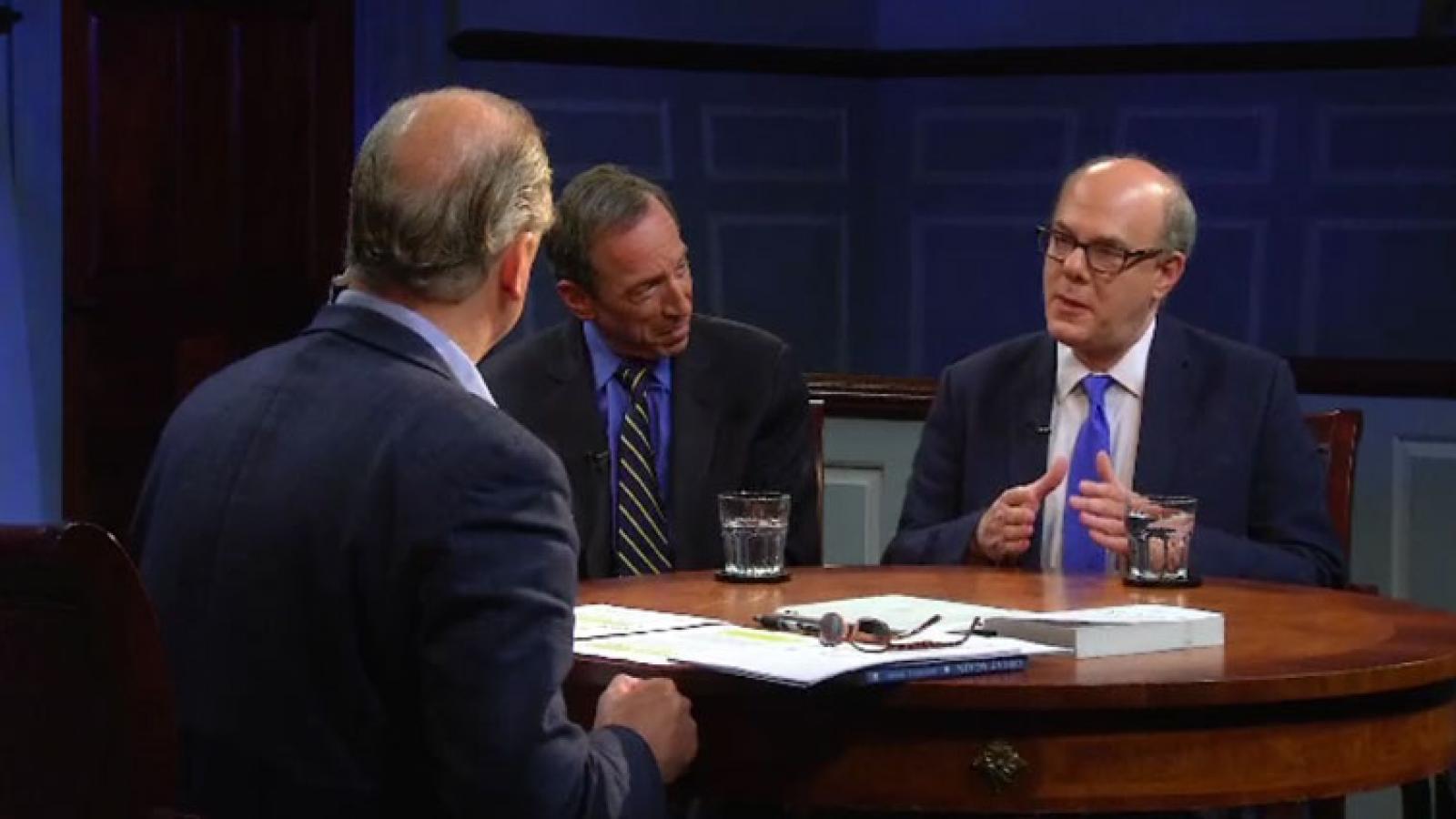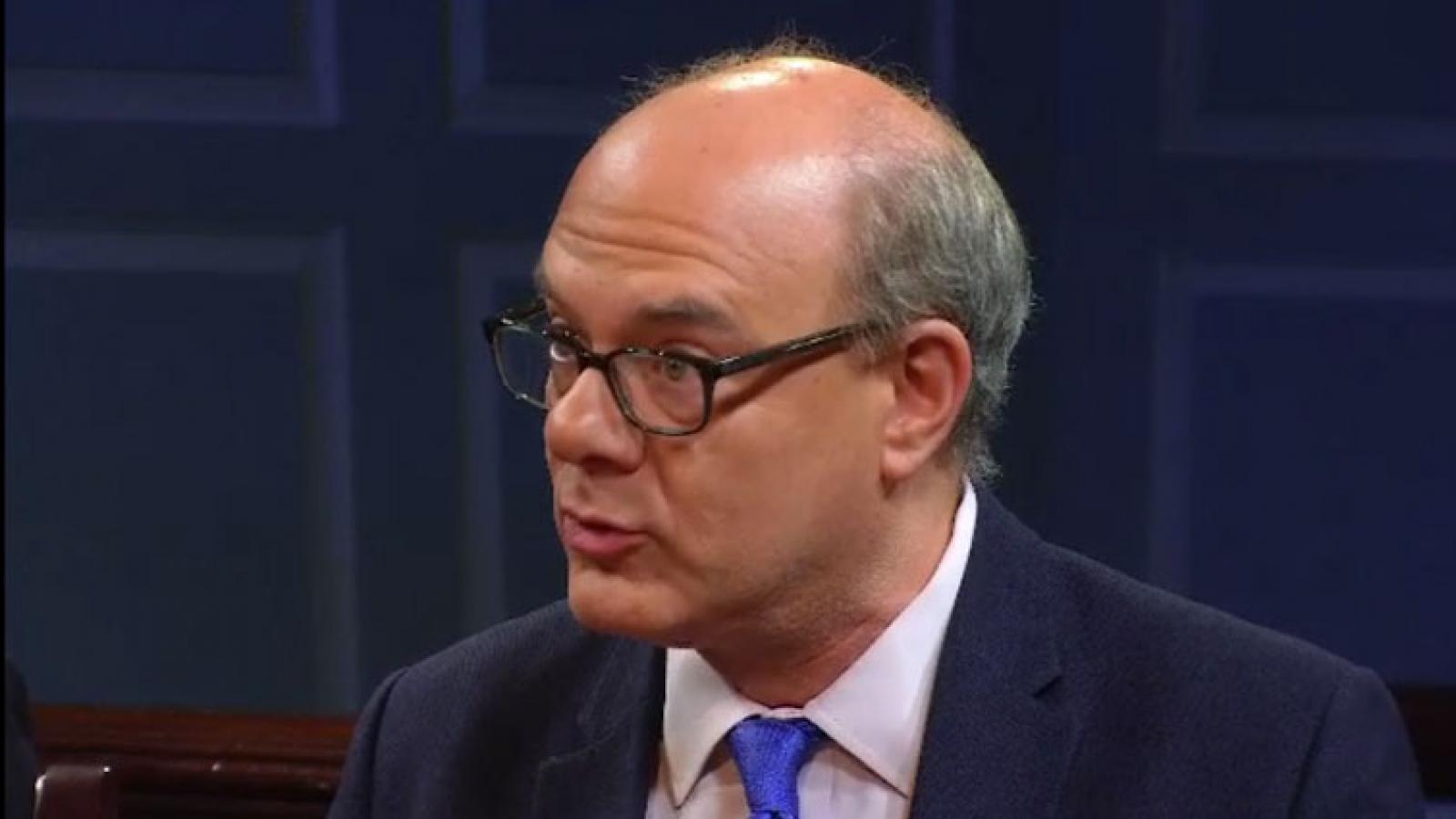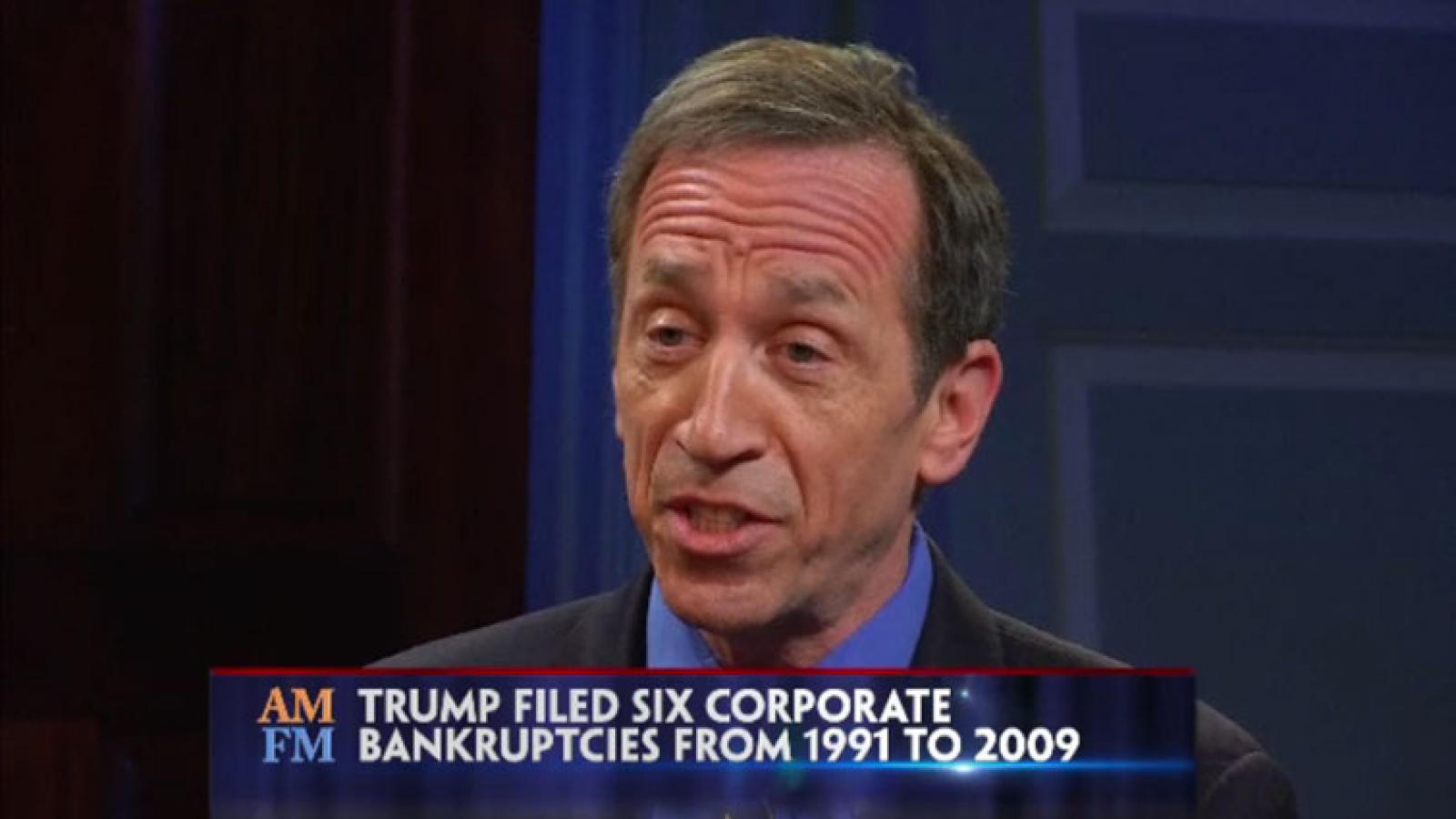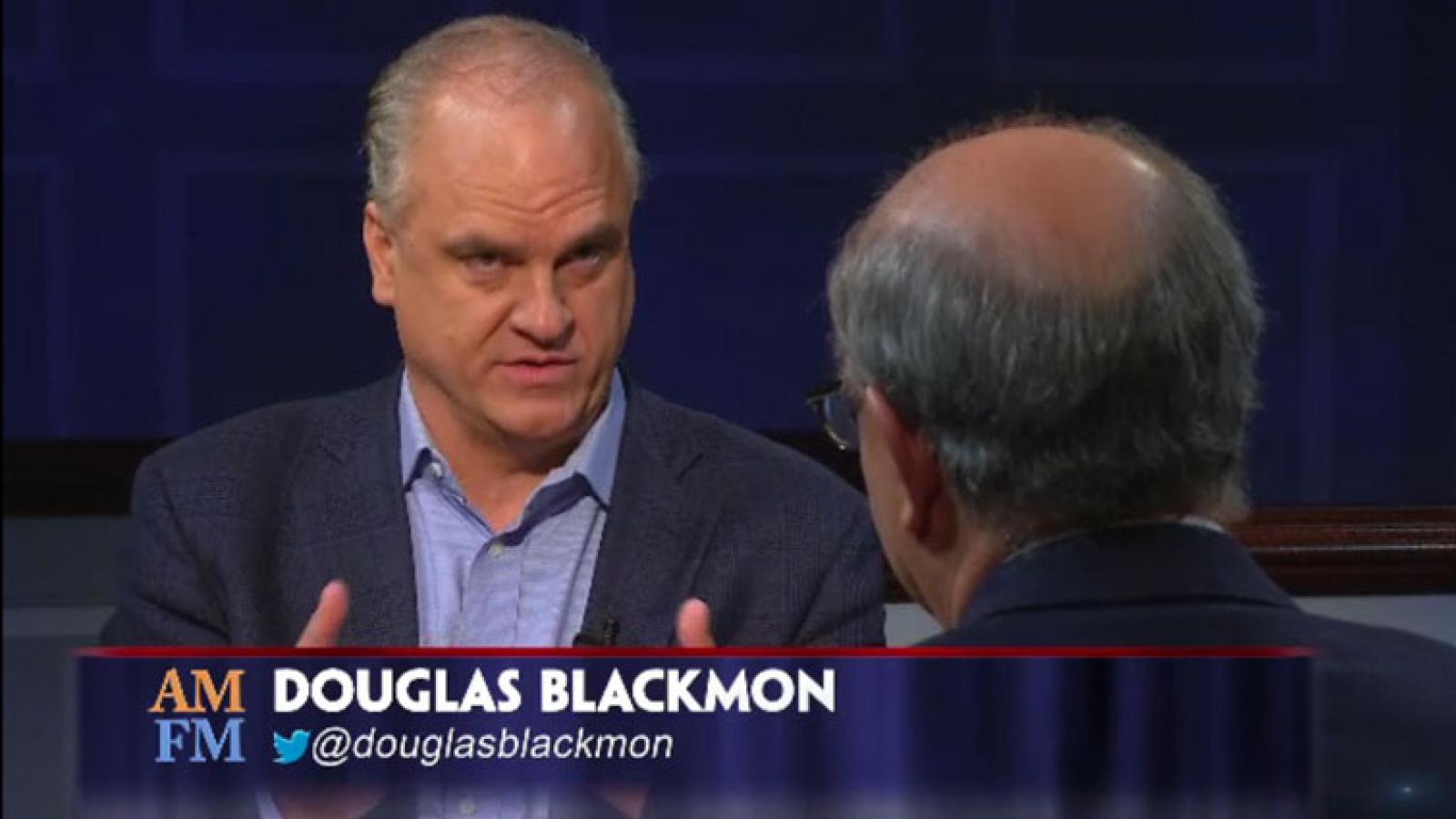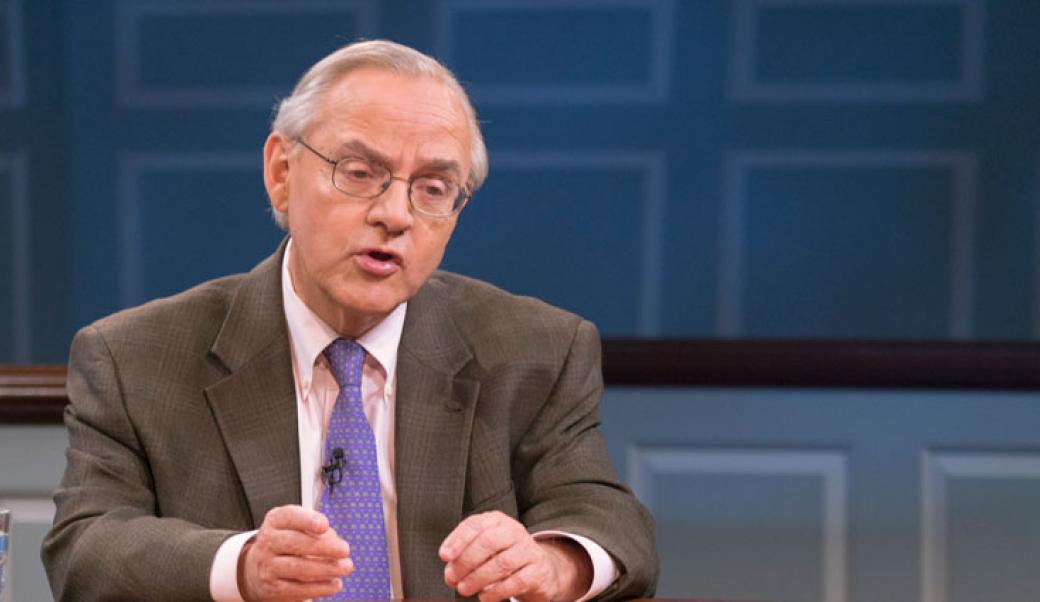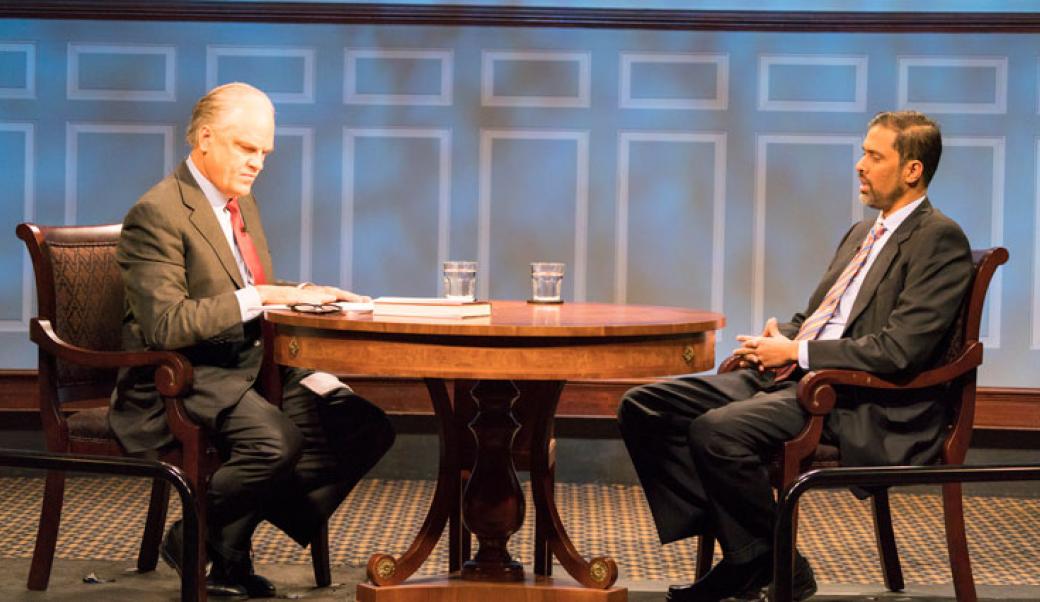About this episode
April 09, 2017
Michael Kranish and Marc Fisher
Donald Trump biographers Michael Kranish and Marc Fisher of the Washington Post look at the Trump presidency in its early days
The First Year
Did they see the Trump White House coming?
Transcript
Douglas Blackmon solo in studio: Welcome to American Forum – where the discussion is always about the presidency. I’m Doug Blackmon.
TITLE SEQUENCE
Announcer VO: It’s about history. Policy. And impact. A new perspective on current affairs. Bringing experience, insight, civility, and scholarship to the urgent issues of today. It’s about our past, present, and future. Your host: Pulitzer prize-winning author and journalist, Douglas Blackmon. From the University of Virginia’s Miller Center, this is American Forum.
Douglas Blackmon solo in studio: This week on American Forum, two biographers of President Trump return to give an update now that their subject has become President of the United States. In case you missed it, here’s a snippet from six months ago during the campaign: Kranish: “He calls himself an army of one. He calls himself a lone ranger.” Fisher: “He says we’re in a terrible spot, maybe we can make it a little better. It’s a very unusual approach and I’m not sure it’s one that Americans will embrace.”
Douglas Blackmon solo in studio: Well, they did embrace it, at least enough of them did. So now, we are well into the Trump administration, and there’s much more to learn about this most important man in the world. And what better way to do that than with two people who spent so much time reporting on him and writing this book. They collaborated with a large team of colleagues at the Post, who spent many, many hours talking to and writing about Donald Trump. And our guests, spent over 20 hours themselves interviewing the man who now occupies our White House. We had them here back in October, and got their behind the scenes take on candidate Trump. We learned about his family history, his lack of time to read books, his view that narcissism is actually power, and his system for getting advice to make decisions. Now it’s time to bring them back, and look at these and other issues through the lens of the presidency in action. Michael Kranish is an investigative political reporter at the Post and an author of two previous biographies of presidential contenders—John Kerry and Mitt Romney. Marc Fisher is a senior editor at the Post, was an acclaimed foreign correspondent who covered the fall of the Berlin and wrote a book about it. He was a member of two teams of reporters that won Pulitzer Prizes for the Post in 2014 and 2016. Thank you for coming back .
Michael Kranish: Thank you for having us.
Marc Fisher: Good to be back.
Blackmon: So when we talked to you some months ago before the election, it was clear from the book and from our conversations—at least as far as I was concerned—that you guys knew Donald Trump better—certainly as well as, but I think better than anybody in the media. But so, in the events that have occurred now and then most recently with the collapse of President Trump and House Speaker Ryan’s effort to repeal and replace Obamacare, in terms of how all of that played out, this—this extraordinarily large issue for the president, uh, the approach that was taken to winning passage, and then, ultimately, the collapse of—of that effort, did that look familiar to you in terms of what you had learned about the man in this process?
FACTOID: Ryan pulled Republiccan health bill to avoid defea by GOP rebels
Kranish: I’m really not surprised at what happened so far because, as a businessperson, he was successful, but he was also spectacularly unsuccessful on many occasions because he didn’t listen to advice that turned out to be correct. So, time and again, if someone said, “No, that’s not a good idea,” he would push back. He would attack. He would fire someone, and he was able to survive himself, but he wasn’t really held accountable oftentimes.
FACTOID: Trump filed sic corporate bankruptices from 1991 to 2009
So here, in Congress, you’ve got members of Congress who basically have representatives of their own district that they represent, so they’re not accountable in the same way to him, and he thought they would be, that there would be this party unity. It’s a very different situation, but in some ways the weaknesses you saw of him as a businessperson—although he’s known for The Art of the Deal—have come to be shown in the presidency. So, now, the question is, can he do what the title of another book that he wrote is, The Art of the Comeback.
FACTOID: CBS reported 1.1 million copies of Art of the Deal sold as of 2016
FACTOID: The Art of the Comeback is a memoir written with Kate Bohner
Fisher: He was very much, this fit in the pattern of his behavior as a businessman through the decades. We saw throughout his career that he had—really despite the big name that Trump was in business, he worked with a very small group of people who were his inside advisors and the people who ran the operations. He’s not accustomed to dealing with a much larger universe of people as a president has to, and we saw that in the negotiations around the healthcare bill. Additionally, we saw that Donald Trump throughout his career, he would start things, whether he was selling steak or water or building buildings, they were his initiative, and it wasn’t something that had to come together from many different sources. That’s something he just doesn’t have experience on. You never saw him working with other developers for example.
Blackmon: And he’d never had a, a publicly traded company with a very broad shareholder base in which the shareholders are really full participants, uh, in the—in the governance of the corporation. He really never even had that experience.
Kranish: He had one public company. The stock ticker was DJT. The stock price was at one point $35 a share. It went down to $0.17. There were shareholder lawsuits, but at the end he made tens of millions of dollars, and he wasn’t held accountable in the same way that someone else was. Most of his work was with a very small private, uh, family company, so he didn’t have a board of directors who might say, “Mr. Trump, maybe that’s not a good idea. You shouldn’t do that.” Uh, he didn’t have that. He basically had a few family members, and there were one or two trusted advisors, some of whom would then be fired if they disagreed with him, so it’s a very different situation. In the White House, you have family members. You have Ivanka, uh, Trump and her husband Jared Kushner, um, and you have this sort of conflicting group of advisors. Uh, you have Steve Bannon. You have Reince Priebus, the Chief of Staff, so he’s getting advice from many different quarters, and it’s not just family folks, so, uh, he has—you know, he has not done this before. He doesn’t have his own instincts on some of how to deal with Congress.
Blackmon: In a real estate transaction, in a class—that sort of negotiation with, really, two parties, and both parties are presumed to be potential winners in—in those sorts of transactions, where, you know, I’m going to buy this property from you and then do this thing with it, and you’re going too—it’s good for the other party. You’re selling it to me, and it’s good for me that I’m getting it. I mean, that’s the idea of this one-on-one transaction which both parties are very much so motivated to remain a part of the transaction. Where that’s not exactly how it works, as you were just describing in terms of the stakeholders in Congress, but it also makes me think that President Trump might be a more effective negotiator in the political sense if we went back in time a bit, particularly if we went back to the period when there were still earmarks or where—where you could still promise things to members of Congress in return. That would—those sorts of transactions would be more familiar to him.
Fisher: Well, right, and we’re seeing two different kinds of things happening here. In the first part, we don’t have earmarks anymore, so it’s hard for a president or a Congressional leader to give out the goodies that would bring the party together. It’s also difficult for a president in this modern age, especially after Citizens United and the rise of PACs, the parties can’t really provide the discipline that they once did, so that’s true whether Donald Trump is president or anyone else.
FACTOID: Citizens United said limits on donations violate free speech
But it particularly hurts—and we saw this in March in the healthcare battle—it particularly hurts with Donald Trump because he doesn’t have that kind of history with these players. He—he went through the motions. He called them up. He bro—had them over. They went bowling in the White House bowling alley. He did the things that he thought presidents do to win over Congress members, but he—he didn’t know his stuff in the way that most presidents do, and so he wasn’t able to do the kinds of horse trading and persuasion on the merit that, uh, other presidents have done.
Kranish: As a real estate developer, he could meet with contractors and say, “Look, you know, here’s what I’ll pay you,” and then—he would then say later, ‘It wasn’t good work. I’m going to give you 75 percent of that or 50 percent of that.” He held the upper hand. He had the wallet. In this case, Congress has the wallet. They’re the ones who decide whether to spend money, not him, so it’s reversed, and that’s a very big challenge for him.
Fisher: It’s also true that he’s never been someone who is really keyed into the nitty-gritty details of an operation. He is a master marketer. He is the guy who goes out there and sells the project, and that’s what he sees himself doing as president, whether it’s going out and holding the rallies or bringing in members of Congress to rally them. He sees—and, of course, working the press, working the media, that is the core of what he does. He still spends an inordinate amount of time doing that, but a president—president’s power is to persuade, and he needs to persuade not just the public but the actual people in Washington. So he wants to drain the, but he still has to work with the swamp, and that’s something he’s never done before.
FACTOID: Trump vowed to “drain the swamp” of Washington DC. If elected
Donald Trump has two power factions within the White House. He has the good old Republican Party led by Reince Priebus as his Chief of Staff, and he has the real renegade populist economic nationalists led by Steve Bannon, his Chief Strategist. They’re not interested in party discipline. When the party breaks apart as we saw in the healthcare debate, that’s fine with them. That’s actually a good thing for them. Of course, when we think about this through tra—traditional Washington lenses, then we say, “Oh, the Republicans are a mess.” But from a certain portion of the Trump White House’s perspective, that mess is what they’re aiming for.
Blackmon: Right after the election, President Trump—or President-Elect Trump at that point—ah both the speech that he gave on Election Night and a number of other things he said in the—in that first period of time, uh, were much more conciliatory. He was very friendly to President Obama. One of the things he said in that period was that—perhaps Obamacare didn’t have to be completely repealed, that it could be just amended or improved upon. Is there any possibility that any scenarios you could imagine—and, in fact, he—immediately after the collapse of the deal, he made reference to Democrats coming back and making an offer to him, but is there any possibility that you could have Donald Trump going back to Congress with a more Democrat-based version of a—of a big revision to the Affordable Care Act?
Kranish: Well, he had said—earlier in his career, he had said he liked universal healthcare insurance. He liked the individual mandate, which was the key Democratic part that a lot of Republicans don’t like. He wanted to have no preexisting conditions. He wanted those 26 and under to be covered by their parents’ plan. There’s a lot of elements of the Democratic plan that Trump has been saying that he’s for, um, and he also said he would protect Medicare and Medicaid and Social Security. So there’s a lot of things that Democrats would find appealing. It’s unlikely that they would make a big plan, uh, together with him because there are so many things Republicans would not like. So whether he gets all the Democrats and then tries to get some Republicans, it would be an awfully, awfully tough lift, but there are certainly a lot of things there that he has said at various times and then changed his mind that he was in favor of that Democrats would like.
Blackmon: Or ma—perhaps what that tells us is that after the midterm elections—I mean, we’re talking about things far away, but if it were to come to pass after the midterm elections that the House—if it went back to the Democrats somehow or if it was a much—even closer margin in the House, the idea though in that—in that setting of President Trump and a—and a Democratic coalition in the House, it doesn’t strike me as completely crazy.
Fisher: No, it’s not crazy, and in fact Trump is, I think, intellectually open to that idea. He is every bit as much a Democrat as he is a Republican, which is to say not much of either, but—but it’s more than just being open to that. We have parties for a reason. That’s where the ideas traditionally come from. That’s where the policies get worked out.
FACTOID: Trump changed party affiliation seven times; most recently in 2012
Presidents rarely are the ones who are doing the nitty-gritty work of developing a policy. That’s supposed to come from Congress, so we don’t see that because Congress is so polarized, and it’s hard to imagine, given who Trump has surrounded himself with in the White House—that those kinds of specific policy initiatives will come from the White House. So it’s hard to see that scenario coming about, but he’d certainly be open to it.
Blackmon: Yeah. Well, so, uh, congratulations, by the way, on the paperback version of your book coming out. You’ve written a new afterword to the book taking into account that he became president, and one of the things that you guys write in there is that Trump won because he intuited that his celebrity would protect him from the stricter standards that are applied to politicians typically and which—which these gaffes like the—such as the video of him talking in some terrible terms, coarse terms, about women, the sort of thing that would finish off a politician in any past time. Is he just a savant that—that this just came to him, or is that the work of a pretty brilliant strategist and tactician?
Fisher: Well, it’s both, really. I mean, he said right after he lost the healthcare bill—he said that, uh, he works from instinct and that he has really good instincts, and the things he thinks—the things he predicts almost always come to past. Not quite true, but there is some merit to the idea that he’s a guy who has effectively survived and sometimes thrived throughout his career by going from his gut. He’s someone who is allergic to deep study. He’s someone who doesn’t read terribly much. He’s always gotten by by working the image, working the marketing and the brand, and so he believes that he can do that as president as well. And, you know, it’s one thing to be a celebrity builder or celebrity entrepreneur. It’s another thing to bring those ideals and values of celebrity to the presidency as we’ve seen in these initial weeks because there are other factors—factions within the government that need to be massaged and taken care of, and that is not Donald Trump. He has never had a—an experience, really, before where he had to be selfless, and a president has to be selfless sometimes.
Blackmon: All right. So, when you guys were here, uh, uh, six months ago, we—we talked about a lot of the—of how you saw some of these, uh, dimensions of the now-President in those—at that point. But so we thought we would pull a few clips from what you had to say six months ago, uh, and see what you think about them now.
[video playing] Fisher: Because he felt from the start, this was a really remarkable insight that he had as far back as his early twenties, when he decided that his business success would be determined not so much by his skill at managing day to day but by how well he did at creating an image that other people would aspire to emulate, and that image was of this billionaire playboy, uh, to whom came things came easily, who ruled by his gut, by his instinct. Uh, and this was an insight that he had at this very early age and continues to manage to this day. His—his great skill and the thing he spends the most time on is managing and manipulating the media to create that image.
Blackmon: So that corresponds to some of what you were saying just a minute ago, but at the same time, in terms of these first months of his presidency, are we seeing that that approach, just pure media management, “I’m a star, and my star power is going to overwhelm the situation to my favor,” doesn’t necessarily seem to be working out.
Fisher: Well, it works with his base, so it’s a question of does he define success as maintaining his base and maintaining the group of people who he thinks can get him reelected, or does he define it as reaching out to a broader swath of the American public. No evidence of that quite yet, and it’s also—it’s not just done for political advantage. It’s done to keep him going every day. It’s what—it’s what he feeds off of, uh, and then there’s also the dichotomy between the press bashing that he does as well as the media manipulation that he does. Uh, and they really fit hand in glove, and I think, you know, a lot of people see the bashing of the media as the enemy of the people, and they think, “Oh, he’s going after the elites and the intellectuals and the academics and the press.” Yes, but he’s also working the—the reporters day and night. He’s calling them on their cell phones. He’s reaching out to them unsolicited, and so that has always been the yin yang of how Donald Trump deals with the media and burnishes his own image.
Blackmon: I mean, in fact, just after the collapse of the healthcare deal, uh, he picked up the phone and, unsolicited, called Bob Costa at the—at The Washington Post, right? He was sort of one—maybe the first reporter to hear from the White House. I mean, that’s an example of that, right?
Kranish: Totally.
Blackmon: I mean, on one hand throwing fireballs constantly, on the other hand, you know, “Hey, buddy. Here’s the word.”
Kranish: He’s an avid reader of newspapers. There’s no question about that. He reads the print copies or he has stories printed out for him, and he does—even though he, you know, bashes us as fake news or whatever, um, you know, he does read The Post and he reads The New York Times. He reads The Wall Street Journal, um, and he will tell aides, “You know, look, I read this,” and he gets angry about things or, “Let’s call that person.” So, uh, he is a consumer of the news that he says is fake.
Blackmon: All right. Let’s move on to another clip. Uh, this one, uh, uh, where Michael is our—is our primary person, uh, talking about the president’s narcissism as you wrote about it in the book.
[video playing] Kranish: He had said that there’s a power of narcissism. Well, there’s a book by that title, The Power of Narcissism. He calls himself an “army of one.” He calls himself a “lone ranger.” He believes that he is the answer and that you have to be, uh—basically plow forward no matter what, even if you leave, uh, people behind you in your wake, uh, even if you run roughshod over them, that that’s how you move forward. And he said that when he has financial difficulties, he was looking out for Donald Trump, um, and that he had to survive and that he would do what was necessary to survive.
Blackmon: So that also, uh—not just the narcissism and his sense of the power of narcissism and this bulling ahead because of his sense of confidence in himself, and a lot of people since he’s been in office—there’s been this whole discussion about narcissism as a diagnosed condition, uh, psychologically, but—but there’s also been a discussion and observation—I think, Mark, you wrote a story about this—of the, uh—of how alone the president seems to be or whether he actually has friends and the fact that his—his wife is not really in the White House with him, um, and I wonder how—how—and also Chris Cillizza has written in The Post about the president, uh, walking by himself out to the helicopter and just seeming to be a very—a lonely figure or a singular, solitary figure in the White House. I wonder how that relates to or doesn't relate to the—this—this narcissistic thing.
Kranish: Well, you know, Donald Trump, he has said that he is an army of one, and what he’s learned here is that, actually, the president proposes, as the saying goes, and Congress disposes. Congress has a lot of power, 535 people who believe they are powerful and they should be listened to. It’s a very different situation. He’s not just the chief executive of a small company that’s not really accountable to anybody. He has got a lot of people questioning him who don’t necessarily have allegiance to him, who may have actually gotten more votes, um, in a percentage basis in their district than Donald Trump did, so that’s a very new finding, uh, for Donald Trump that he has to deal with, and he can’t just force his will. It’s not so simple. He doesn’t have all the power. Uh, like I said, Congress holds the purse strings, so he has to go to them, and he’s learning how difficult that is.
Fisher: Donald Trump’s personality is really a revelation to a lot of people in Washington, whether they supported him or opposed him. What they’re discovering in the early weeks of this presidency is that he operates in a very different way from any previous president, so members of Congress will come to him, and he does not engage in the kind of policy discussion that they were accustomed to having, uh, in a—in a very detailed way with a Bill Clinton or with a Barack Obama, or in a more philosophical way with a Ronald Reagan or—or a George Bush. Uh, with Donald Trump, he’s not one for lengthy conversation. He’s not one for detail, uh, and he—and what these people come out of the office saying is, “It’s all about him,” and that gets to this narcissism point. Uh, this is something that, uh, he can be a little bit joking about, about himself, but it’s something that people around him are learning is something they have to play to or they think they have to play to. And so you have people kind of tiptoeing around this president in a way that they have not done in the recent past.
Blackmon: Uh, let’s listen to—to one more clip, uh, uh, this one that speaks, I think, very much actually to what Mark was just discussing.
[video playing] Fisher: Donald Trump’s mindset is a very binary one. Uh, people are either good or bad. They’re great, or they’re awful. They’re fabulous reporters or media lowlifes, and so, in every aspect of his life, he sees this. And, you know, I think he’s—he’s someone who grew up this way in part because he had a very cold and distant father who was very, uh, directed about telling him, “In life, you have to be a winner. You have to be a killer,” and that the greatest shame in life was to be a nothing.
Blackmon: So everyone is either good or bad, uh, certainly that’s been the approach to media, uh, but has—is that what we’ve seen play out, this binary approach to—to everyone?
Fisher: Absolutely, and that’s not unique to Donald Trump. Lyndon Johnson was very much the same way, but Trump takes it an extra step, and he doesn't—because he doesn’t engage in policy to the same extent as other presidents, it really does boil down to that judgment. “He’s with me. He’s against me.” Uh, and so we do see that in the way he was willing at the end of the healthcare debate to just pull the bill, be done with it, uh, did not want to see it play out. He’s ready to move on to the next thing, and he gets kind of petty about it and says, “Well, we’ll just have to wait for Obamacare to implode, uh, and then they’ll come begging for me to do something.” Uh, and, you know, it sounds almost adolescent, uh, but that is very much the way he thinks. It is a binary world, and if you’re not supporting him and if you’re not giving him the credit, then you’re the guy who’s against him, and he wants nothing further to do with you.
Blackmon: So, but, Michael, given that, the—and, again, comparing it back to approaching things as a businessperson versus as a political leader. Is there the possibility that—that he remains in a kind of paralyzed morass partly driven by this—beginning to conclude that way more people than he can handle are bad, if it’s got to be one or the other. What does that begin to do to him based on the—your understanding of him? Can he bear that kind of a circumstance?
Kranish: Well, I talked to a friend of his who described Donald Trump as seeing himself as a doer. “I build things. These people in Congress, they just talk about stuff on and on. It goes around in circles. Nothing gets accomplished.” So he’ll have to change his approach in some way, because it’s not a one-sided conversation like it could be when he was a developer, when he could simply go to someone and say, “I’ve got the money. Here’s what we’re doing. Here’s how we’ll do it. You know, are you in or are you out?” In this case, he will have to engage in discussions. So far, for Donald Trump, his ideology has been the ideology of winning for himself, and now he’s got to find how do I make that guy feel like he or she has won so that we’re all in this together, and it’s been very tough for him to understand that.
Blackmon: But some people have begun to already say—I don’t agree with this. I’d tell you this is extremely unlikely, but people are already saying, “Well, if he can’t get some things done, then he’s just going to resign in frustration. He won’t stay around. He’s only going to be in office for one year.” Is there any kind of plausibility to that kind of reaction?
FACTOID: Nixon was only president to resign, on August 9, 1974, after Watergate
Fisher: I don’t see that scenario in any way. I mean, this is not a guy—
Blackmon: Neither do I.
Fisher: —who has any history of, uh, taking on a loss voluntarily. (laughs) Uh, he has had many experiences with losing and many experiences with moving on to the next thing, uh, but he usually does so in such a way that he can at least in his own mind declare victory, uh, even if no one else shares that perception.
Blackmon: One last question before I let you guys go. Uh, there are lots of adages about the media. Uh, the one that newspaper people have always liked the best is that, uh, you shouldn’t get in arguments with people who buy ink by the barrel, uh, the implication being that, uh—that newspapers will pound you or TV will pound you if you get in an argument with them. But there’s also the old adage about that there’s no bad—there’s no such thing as bad publicity, and P.T. Barnum saying, “Write whatever you want about me, but just spell my name right.” Uh, and it seems that Donald Trump may well have proved—at least up to now—that P.T. Barnum was the one who understood media and—and what—at least what works most effectively now, far more so than that old—buying ink by the barrel, but is that right?
Fisher: Well, sure, and Donald Trump, uh, didn’t get here by accident. He’s had nearly half a century of experience working the media, burnishing his image, uh, and doing so in such a way that he comes out on top. Fine. But whether it’s the Wizard of Oz or P.T. Barnum or Joseph McCarthy, who is perhaps the better analogy, those kinds of figures get their comeuppance in part because of the extreme exposure that they’re granted by the media.
FACTOID: Senator McCarthy began communist probe in 1950 West Virginia speech
So the same media exposure that pumped him up and perhaps allowed him to—to become the nominee and then the president, that same exposure over time—our experience has been through history—is what brings down people who enter the public sphere in this egotistic, narcissistic manner. Whether that happens or not, we’ll see.
Blackmon: What do you say?
Kranish: Well, the image has been out there. It helped him get elected president. but now that you’re going into the nitty-gritty, well, he said he was the art of the deal and the dealmaker, but he couldn't get healthcare passed. There’s a conflict there, and if that happens again and again people will say, “Is the image real, or was that just a reality show?”
Blackmon: Michael Kranish, Marc Fisher thanks for being back. (Kranish: thanks for having us. Fisher: Great to be here.)
Blackmon: There was no fake news in that conversation and there never will be on American Forum. Coming up soon on future episodes of this program, Nobel Prize Winner Joseph Stiglitz and his sharp critique of President Trump’s economic agenda, Conservative icon Bill Kristol, and—at a moment when across the political spectrum citizens have been asserting themselves loudly—we’ll soon bring you Eric Liu, founder of Citizen University and author of the new book: You're More Powerful Than You Think: A Citizen's Guide to Making Change Happen. You can watch American Forum every week on a local PBS affiliate or their website. Our broadcasts are also live and unedited at the Miller Center Facebook page, where a half million people have tuned in and given us comments and reactions—Thank you for those—and your emails and letters and thousands of engagements of Twitter. We also have a very cool new website at MillerCenter.org. Check it out. And follow us on Twitter. My handle is @douglasblackmon, Michael Kranish is @PostKranish, and Marc Fisher is @mffisher. See you next week.
